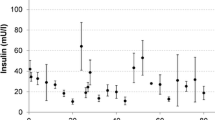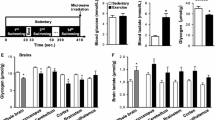Abstract
Patients with diabetes display a progressive decay in the physiological counter-regulatory response to hypoglycemia, resulting in hypoglycemia unawareness. The mechanism through which the brain adapts to hypoglycemia may involve brain glycogen. We tested the hypothesis that brain glycogen supercompensation following hypoglycemia depends on blood glucose levels during recovery. Conscious rats were submitted to hypoglycemia of 2 mmol/L for 90 min and allowed to recover at different glycemia, controlled by means of i.v. glucose infusion. Brain glycogen concentration was elevated above control levels after 24 h of recovery in the cortex, hippocampus and striatum. This glycogen supercompensation was independent of blood glucose levels in the post-hypoglycemia period. In the absence of a preceding hypoglycemia insult, brain glycogen concentrations were unaltered after 24 h under hyperglycemia. In the hypothalamus, which controls peripheral glucose homeostasis, glycogen levels were unaltered. Overall, we conclude that post-hypoglycemia glycogen supercompensation occurs in several brain areas and its magnitude is independent of plasma glucose levels. By supporting brain metabolism during recurrent hypoglycemia periods, glycogen may have a role in the development of hypoglycemia unawareness.



Similar content being viewed by others
Explore related subjects
Discover the latest articles and news from researchers in related subjects, suggested using machine learning.References
Warren RE, Frier BM (2005) Hypoglycemia and cognitive function. Diabetes Obes Metab 7:493–503
Cryer PE (2004) Diverse causes of hypoglycemia-associated autonomic failure in diabetes. N Engl J Med 350:2272–2279
Fanelli CG, Pampanelli S, Porcellati F, Bolli GB (1998) Shift of glycaemic thresholds for cognitive function in hypoglycemia unawareness in humans. Diabetologia 41:720–723
Marty N, Dallaporta M, Thorens B (2007) Brain glucose sensing, counterregulation, and energy homeostasis. Physiology 22:241–251
Boyle PJ, Nagy RJ, O’Connor AM, Kempers SF, Yeo RA, Qualls C (1994) Adaptation in brain glucose uptake following recurrent hypoglycemia. Proc Natl Acad Sci USA 91:9352–9356
Criego AB, Tkáč I, Kumar A, Thomas W, Gruetter R, Seaquist ER (2005) Brain glucose concentrations in patients with type 1 diabetes and hypoglycemia unawareness. J Neurosci Res 79:42–47
McCall AL, Fixman LB, Fleming N, Tornheim K, Chick W, Ruderman NB (1986) Chronic hypoglycemia increases brain glucose transport. Am J Physiol Endocrinol Metab 251:E442–E447
Mason GF, Petersen KF, Lebon V, Rothman DL, Shulman GI (2006) Increased brain monocarboxylic acid transport and utilization in type 1 diabetes. Diabetes 55:929–934
Choi IY, Seaquist ER, Gruetter R (2003) Effect of hypoglycemia on brain glycogen metabolism in vivo. J Neurosci Res 72:25–32
Canada SE, Weaver SA, Sharpe SN, Pederson BA (2011) Brain glycogen supercompensation in the mouse after recovery from insulin-induced hypoglycemia. J Neurosci Res 89:585–591
Herzog RI, Chan O, Yu S, Dziura J, McNay EC, Sherwin RS (2008) Effect of acute and recurrent hypoglycemia on changes in brain glycogen concentration. Endocrinology 149:1499–1504
Oz G, Kumar A, Rao JP, Kodl CT, Chow L, Eberly LE, Seaquist ER (2009) Human brain glycogen metabolism during and after hypoglycemia. Diabetes 58:1978–1985
Suh SW, Bergher JP, Anderson CM, Treadway JL, Fosgerau K, Swanson RA (2007) Astrocyte glycogen sustains neuronal activity during hypoglycemia: studies with the glycogen phosphorylase inhibitor CP-316,819 ([R-R*,S*]-5-chloro-N-[2-hydroxy-3-(methoxymethylamino)-3-oxo-1-(phenylmethyl)propyl]-1H-indole-2-carboxamide). J Pharmacol Exp Ther 321:45–50
Cardell M, Siesjö BK, Wieloch T (1991) Changes in pyruvate dehydrogenase complex activity during and following severe insulin-induced hypoglycemia. J Cereb Blood Flow Metab 11(1):122–128
Blanco AM, Gómez-Boronat M, Pérez-Maceira J, Mancebo MJ, Aldegunde M (2015) Brain glycogen supercompensation after different conditions of induced hypoglycemia and sustained swimming in rainbow trout (Oncorhynchus mykiss). Comp Biochem Physiol A Mol Integr Physiol 187:55–60
Öz G, DiNuzzo M, Kumar A, Moheet A, Khowaja A, Kubisiak K, Eberly LE, Seaquist ER (2016) Cerebral glycogen in humans following acute and recurrent hypoglycemia: implications on a role in hypoglycemia unawareness. J Cereb Blood Flow Metab. doi:10.1177/0271678X16678240
Lei H, Gruetter R (2006) Effect of chronic hypoglycemia on glucose concentration and glycogen content in rat brain: a localized 13C NMR study. J Neurochem 99:260–268
Oz G, Tesfaye N, Kumar A, Deelchand DK, Eberly LE, Seaquist ER (2012) Brain glycogen content and metabolism in subjects with type 1 diabetes and hypoglycemia unawareness. J Cereb Blood Flow Metab 32(2):256–263
Morgenthaler FD, Koski DM, Kraftsik R, Henry PG, Gruetter R (2006) Biochemical quantification of total brain glycogen concentration in rats under different glycemic states. Neurochem Int 48:616–622
Poitry-Yamate C, Lei H, Gruetter R (2009) The rate-limiting step for glucose transport into the hypothalamus is across the blood-hypothalamus interface. J Neurochem 109:38–45
Cruz NF, Dienel GA (2002) High glycogen levels in brains of rats with minimal environmental stimuli: implications for metabolic contributions of working astrocytes. J Cereb Blood Flow Metab 22:1476–1489
Sagar SM, Sharp FR, Swanson RA (1987) The regional distribution of glycogen in rat brain fixed by microwave irradiation. Brain Res 417:172–174
Alquier T, Kawashima J, Tsuji Y, Kahn BB (2007) Role of hypothalamic adenosine 5′-monophosphate-activated protein kinase in the impaired counterregulatory response induced by repetitive neuroglucopenia. Endocrinology 148:1367–1375
Kumagai AK, Kang YS, Boado RJ, Pardridge WM (1995) Upregulation of blood-brain barrier GLUT1 glucose transporter protein and mRNA in experimental chronic hypoglycemia. Diabetes 44:1399–1404
Simpson IA, Appel NM, Hokari M, Oki J, Holman GD, Maher F, Koehler-Stec EM, Vannucci SJ, Smith QR (1999) Blood-brain barrier glucose transporter: effects of hypo- and hyperglycemia revisited. J Neurochem 72:238–247
Matsui T, Ishikawa T, Ito H, Okamoto M, Inoue K, Lee MC, Fujikawa T, Ichitani Y, Kawanaka K, Soya H (2012) Brain glycogen supercompensation following exhaustive exercise. J Physiol 590(Pt 3):607–616
Sokoloff L, Reivich M, Kennedy C, Des Rosiers MH, Patlak CS, Pettigrew KD, Sakurada O, Shinohara M (1977) The [14C]deoxyglucose method for the measurement of local cerebral glucose utilization: theory, procedure, and normal values in the conscious and anesthetized albino rat. J Neurochem 28(5):897–916
Archer DP, Elphinstone MG, Pappius HM (1990) The effect of pentobarbital and isoflurane on glucose metabolism in thermally injured rat brain. J Cereb Blood Flow Metab 10:624–630
Pelligrino DA, Segil LJ, Albrecht RF (1990) Brain glucose utilization and transport and cortical function in chronic vs. acute hypoglycemia. Am J Physiol 259(5 Pt 1):E729–E735
Duarte JMN, Gruetter R (2012) Characterization of cerebral glucose dynamics in vivo with a four-state conformational model of transport at the blood-brain-barrier. J Neurochem 121(3):396–406
Agardh CD, Folbergrová J, Siesjö BK (1978) Cerebral metabolic changes in profound, insulin-induced hypoglycemia, and in the recovery period following glucose administration. J Neurochem 31(5):1135–1142
Ghajar JB, Plum F, Duffy TE (1982) Cerebral oxidative metabolism and blood flow during acute hypoglycemia and recovery in unanesthetized rats. J Neurochem 38(2):397–409
Duckrow RB (1988) Glucose transfer into rat brain during acute and chronic hyperglycemia. Metab Brain Dis 3(3):201–209
Duarte JMN, Carvalho RA, Cunha RA, Gruetter R (2009) Caffeine consumption attenuates neurochemical modifications in the hippocampus of streptozotocin-induced diabetic rats. J Neurochem 111:368–379
Duarte JMN (2015) Metabolic alterations associated to brain dysfunction in diabetes. Aging Dis 6(5): 304–321
Sickmann HM, Waagepetersen HS, Schousboe A, Benie AJ, Bouman SD (2010) Obesity and type 2 diabetes in rats are associated with altered brain glycogen and amino-acid homeostasis. J Cereb Blood Flow Metab 30(8):1527–1537
Dringen R, Hamprecht B (1992) Glucose, insulin, and insulin-like growth factor I regulate the glycogen content of astroglia-rich primary cultures. J Neurochem 58(2):511–517
Acknowledgements
This work was supported by the Swiss National Science Foundation (SNSF, Grant 122498), the National Institutes of Health (Grant R01NS042005), and the Centre d’Imagerie BioMédicale (CIBM) of the UNIL, UNIGE, HUG, CHUV, EPFL and the Leenaards and Jeantet Foundations. JMND was supported by the SNSF Ambizione program (Grant 148250). The authors are grateful to Dr. Igor Allaman (Laboratory of Neuroenergetics and Cellular Dynamics, EPFL) and Dr. Ana F. Soares (LIFMET, EPFL) for fruitful discussions.
Author information
Authors and Affiliations
Corresponding author
Ethics declarations
Conflict of interest
None.
Rights and permissions
About this article
Cite this article
Duarte, J.M.N., Morgenthaler, F.D. & Gruetter, R. Glycogen Supercompensation in the Rat Brain After Acute Hypoglycemia is Independent of Glucose Levels During Recovery. Neurochem Res 42, 1629–1635 (2017). https://doi.org/10.1007/s11064-017-2178-z
Received:
Revised:
Accepted:
Published:
Issue Date:
DOI: https://doi.org/10.1007/s11064-017-2178-z
Keywords
Profiles
- João M. N. Duarte View author profile




